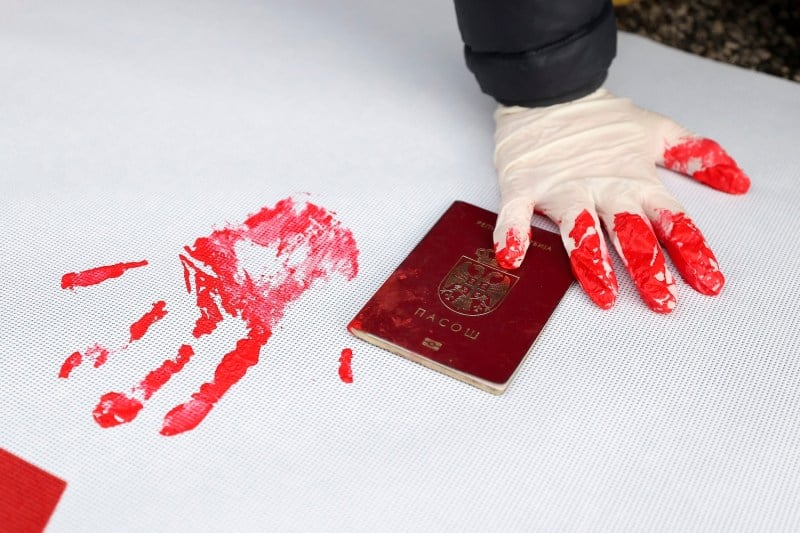Deference to Passports Puts Dissidents at Risk

Deference to Passports Puts Dissidents at Risk
Biometrics, already used in some border crossings, could help protect activists.
A man wearing a glove covered with red paint leaves a mark over a passport of the Republic of Serbia, as part of an action organized by the Croatian Women’s Network and the Center for Women’s Studies during a protest in front of the Embassy of the Republic of Serbia in Zagreb, Croatia, on Jan. 27. Damir Sencar/AFP/Getty Images
For nearly four centuries, international relations have been anchored by the sovereign powers enshrined in the 1648 Treaty of Westphalia. Mutual respect for sovereignty means that governments of every type, whether a liberal democracy or a brutal autocracy, show deference to one another’s monopoly power over the movement of their citizens overseas.
What this means today is that to cross a border, a traveler must present a passport or at least be registered to one. And with rare exceptions, good luck trying to board an international flight without a passport.
For nearly four centuries, international relations have been anchored by the sovereign powers enshrined in the 1648 Treaty of Westphalia. Mutual respect for sovereignty means that governments of every type, whether a liberal democracy or a brutal autocracy, show deference to one another’s monopoly power over the movement of their citizens overseas.
What this means today is that to cross a border, a traveler must present a passport or at least be registered to one. And with rare exceptions, good luck trying to board an international flight without a passport.
But deference to the passport as the sole criterion for identification and international movement gives dictatorships unchecked power over their citizens. This, in turn, can be a catastrophe for dissidents who oppose these regimes and their policies.
Authoritarian regimes don’t just issue passports—they also revoke them. Even when a citizen has escaped to the “security” of overseas, they can be coerced by the dictatorship they left behind if it cancels their passport or revokes their citizenship, making them stateless.
That’s why relying on passports as the only basis of international mobility is a gift to dictatorships. The world’s democracies risk becoming the dictators’ witting enablers and need to pilot an alternative to enable the mobility of activists who lack dual citizenship.
While it is easy to understand why governments so jealously guard the principle of sovereignty, a select group of oppositionists are at risk of persecution even when overseas. Biometric technology—already used for identification purposes—could also be used to enable travel, entry, and exit into democratic countries. This would prevent dictatorships from abusing their passport power extraterritorially to silence dissent.
Take the regime of Russian President Vladimir Putin or Venezuelan President Nicolás Maduro: These dictatorships obviously control entry and exit into their own countries but can also abuse passport power to harass, coerce, and then immobilize their citizens abroad.
They do so in three ways.
First, dictatorships in Moscow, Havana, and Tehran, no differently than liberal democracies in London and Paris, can revoke passports. This does not make people stateless under international law, but they are immobilized since they lack a valid travel document. Solutions exist, such as rarely used passport waivers. But generally, travelers without passports are unable to board a plane, journey more than once, or move around regularly.
Second, dictatorships can cancel citizenships, not just passports. And this does make the target stateless, exposing them to risk of deportation or, if they apply for asylum, capricious rules that may force them to remain in place for years. Asylum rules immobilize oppositionists and dissidents because an application can take years to clear and generally places restrictions on travel, work, and political activity: Once stranded in place, waiting for asylum, they cannot travel to speak out internationally, which is precisely the dictatorships’ intent.
Third, dictatorships can attempt to seize their citizens overseas—for instance, by issuing an Interpol red notice, which is a global alert system through which member governments can request law enforcement around the world to provisionally arrest someone and then seek their extradition. While a red notice is not a formal arrest warrant, a traveling dissident who lands at a foreign airport can have this notice pop up on an immigration officer’s computer screen, leading to detention, custody, or deportation when the dictatorship demands they be rendered for fake “crimes,” such as criticizing the dictator, regime policies, or, in Putin’s case, opposing the war or supporting Ukraine, which have been criminalized.
For oppositionists who have escaped overseas but lack dual citizenship and the security of a second passport, this is a personal catastrophe. For the world’s democracies, it is also a moral catastrophe: It makes them complicit with dictatorships’ abuse of sovereign power to hound activists while immobilizing and silencing dissent abroad.
The good news is that advances in biometrics offer a technological solution. Indeed, many countries, including the United States, have taken the first step already: They use biometrics to establish and confirm travelers’ identities.
For example, Global Entry machines at U.S. airports no longer require that enrolled citizens or green card holders even show their passport. The program allows preapproved travelers to verify their identity using facial recognition. Singapore, a technology pioneer, has launched passport-free border controls that use facial and iris biometric data. The European Union’s Entry/Exit System records biometric data, including facial images, of travelers on entry and exit.
But these biometrics don’t ultimately permit entry, they only make it speedier. In all three cases, the biometrics link back to the traveler’s legal documents. No government has yet been so bold to use biometrics in lieu of a passport.
The next step, then, is to leverage biometrics for this broader purpose. A select group of the world’s democracies should launch a pilot project to permit known oppositionists and dissidents without dual citizenship to travel and cross borders. This group would have to be identified and selected by diplomatic agreement, based on jointly set criteria and a shared list of names.
This pilot would begin by collecting identifying biometrics, but ensuring the data is protected for the dissidents’ own safety. Governments already collect and store biometric data for passports, visas, and residency permits, with no known deliberate instances of democratic states compromising or leaking such data to authoritarian regimes.
Such a system would enhance security, including against state-sponsored authoritarian hacking, while ensuring self-sovereign identity, thereby minimizing risks and strengthening identity protection. Indeed, one of the two co-authors of this piece has actively litigated at the European Court of Human Rights against Russia’s use of facial recognition for totalitarian control. Privacy and cybersecurity must be prioritized because authoritarian regimes have weaponized facial recognition and biometric surveillance to suppress dissent.
A system that does so would leverage elements including multimodal biometric verification; blockchain for data security; encrypted digital identity; and uniform standards for biometric data collection, storage, and usage—all to ensure interoperability across borders as well as robust identity verification.
Dissidents will ask how this protects their personal data. The answer lies in avoiding centralized databases, which pose significant risks of misuse, breaches, and authoritarian control. Instead, a decentralized system could store biometric data locally—on devices or encrypted personal keys—ensuring that individuals maintain full control over their data.
Local storage on smartphones, smart cards, or hardware tokens can enhance convenience and security for users. The data can be stored in secure device environments or digital wallets, with protection assured through hardware encryption, multifactor authentication, and temporary digital signatures that prevent duplication or unauthorized access. This should reduce the risk of loss or forgery of these biometrically based humanitarian digital passports while allowing for secure online authentication.
Some nations are already testing such local storage technologies: Germany has implemented eID on smartphones, the United States is integrating mobile IDs into the Apple and Google Play stores, and Estonia is developing digital passport frameworks through its e-residency program. This approach would also comply with the highest privacy standards, such as those outlined in Europe’s General Data Protection Regulation (GDPR). Independent international organizations could be asked to regularly assess data security.
Governments, for their part, will question whether they lose visibility on travelers. But even with biometric verification, border controls will inevitably record that a specific individual has crossed the border. And this is no different from how passport-based systems currently function.
In parallel to this biometric pilot, the world’s democracies should pursue additional ways to address authoritarians’ withdrawal of dissidents’ travel documents. The 1963 Vienna Convention on Consular Relations allows consulates to issue emergency travel documents. Democracies could seek to expand this provision to include biometric travel documents for citizens whose governments refuse to renew their passports. These documents would not replace citizenship but instead function as interim solutions for mobility.
Democracies could also expand the writ of major international conventions: the 1954 Convention relating to the Status of Stateless Persons and the 1961 Convention on the Reduction of Statelessness. These could be amended to cover individuals immobilized by a refusal to renew their documents. A new category—effectively stateless persons—could be introduced to provide travel rights without undermining an individual’s legal citizenship. A modern biometric “humanitarian passport” could be created under the auspices of international organizations or a coalition of liberal democracies, enabling dissidents and activists to travel.
Additionally, United Nations agencies, including the International Organization for Migration and the high commissioner for refugees , could extend their mandate to include biometric travel solutions for individuals unable to renew their passports. This would require coordinated agreements between participating states to recognize such documents as valid for travel.
Of course, there will be skeptics among those who argue that it should be made harder, not easier, to cross a border. Mass migration is politically volatile in the United States and Europe, especially. But there is no intrinsic reason why digital humanitarian passports should conflict with the goals of those who want to more closely scrutinize and manage migration.
For one, many of the individuals affected by authoritarian passport denials are highly educated professionals—scientists, engineers, IT specialists, entrepreneurs, and well-informed journalists. North American and European democracies, even those like the United States that are now highly skeptical of immigration, should want to attract and harness their talent. Without a passport, they have no alternative to being mired for years in asylum claims.
The goal is not to create a second immigration system but to assure a pathway for those who have been made stateless that is anchored in law. Many governments now struggle with overwhelmed asylum systems, processing delays, and bureaucratic inefficiencies. Digital humanitarian passports can help alleviate this pressure by distinguishing between traditional refugees in need of protection and dissidents who require legal mobility to continue contributing economically. In a world where economic power increasingly depends on human capital and data-driven industries, this will align a humanitarian initiative aimed at combating authoritarian abuses of the international system with a forward-looking economic strategy.
By marrying moral imperatives with practical ones in an era of technological competition, democracies can weaken the coercive power of dictatorships and reinforce the principles of human rights and mobility without compromising the principle of sovereignty.
Alena Popova is a Russian oppositionist and founder of Cyber Guardians for Democracy. She has been affiliated with global think tanks, including Harvard University’s Davis Center for Russian and Eurasian Studies and the Woodrow Wilson Center.
Evan A. Feigenbaum is a vice president for studies at the Carnegie Endowment for International Peace. He served as U.S. deputy assistant secretary of state twice, from 2006 to 2007 and again from 2007 to 2009.
More from Foreign Policy
-

Russian President Vladimir Putin looks on during a press conference after meeting with French President in Moscow, on February 7, 2022. The Domino Theory Is Coming for Putin
A series of setbacks for Russia is only gaining momentum.
-

The container ship Gunde Maersk sits docked at the Port of Oakland on June 24, 2024 in Oakland, California. How Denmark Can Hit Back Against Trump on Greenland
The White House is threatening a close ally with a trade war or worse—but Copenhagen has leverage that could inflict instant pain on the U.S. economy.
-

Donald Trump speaks during an event commemorating the 400th Anniversary of the First Representative Legislative Assembly in Jamestown, Virginia on July 30, 2019. This Could Be ‘Peak Trump’
His return to power has been impressive—but the hard work is about to begin.
-

US Secretary of State Marco Rubio greets employees at the State Department in Washington, DC, on January 21, 2025. The National Security Establishment Needs Working-Class Americans
President Trump has an opportunity to unleash underutilized talent in tackling dangers at home and abroad.










Join the Conversation
Commenting on this and other recent articles is just one benefit of a Foreign Policy subscription.
Already a subscriber?
.
Subscribe
Subscribe
View Comments
Join the Conversation
Join the conversation on this and other recent Foreign Policy articles when you subscribe now.
Subscribe
Subscribe
Not your account?
View Comments
Join the Conversation
Please follow our comment guidelines, stay on topic, and be civil, courteous, and respectful of others’ beliefs.
Change your username |
Log out
Change your username:
CANCEL
Confirm your username to get started.
The default username below has been generated using the first name and last initial on your FP subscriber account. Usernames may be updated at any time and must not contain inappropriate or offensive language.